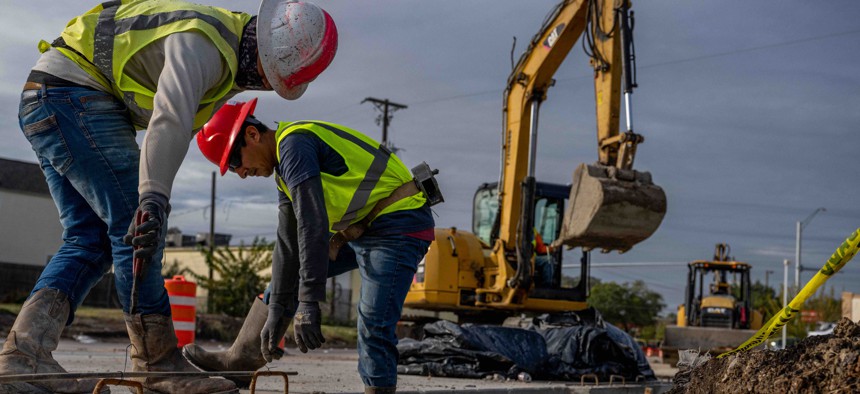A ‘Bootcamp’ to Help Smaller Cities Win Infrastructure Grants

Brandon Bell/Getty Images
Small and midsize localities tend to lack the dedicated grant-writing teams and expertise that bigger towns use to score federal dollars. A new–and free–initiative aims to get them onto more equal footing competing for the funding.
Smaller-sized cities are often at a disadvantage competing for federal grants, lacking the staff, in-house knowhow and other resources that their larger peers can depend on when going after the money.
But now, with billions of dollars of the grants available to local governments in the 2021 infrastructure law, the National League of Cities, with support of philanthropic backers, is trying to change that dynamic and give smaller cities a better shot at winning federal dollars. The group is running a series grant application “bootcamps” for 30 different infrastructure law programs. The new initiative, open to cities with fewer than 150,000 residents, kicked off late last year, with a second round about to get underway later this month.
Robert Blaine, director of the Institute for Youth, Education and Families at NLC, explained that the League decided to launch the project because of the vast amount of grant dollars in the $1.2 trillion public works law, and concerns that smaller cities would miss out on the money. Many observers describe the law as a historic chance for cities to score funding that can help with projects in areas ranging from flood protection, to electric vehicle chargers, to street safety.
“There are the usual suspects, the larger cities that have these federal grant-writing teams, that have historically been able to pull down these federal dollars,” Blaine said. “When you look at small to midsize cities, they just haven't been able to compete.”
“So it was the combination of the unprecedented amount of funding that was available and the need, the great need that's there, in small to midsize communities,” he added. "That was the impetus for us."
Each bootcamp is tied to a specific grant program in the Infrastructure Investment and Jobs Act. There are hundreds of programs in the law. NLC chose the 30 it is focused on by considering factors like: Can cities apply for the money directly, rather than going through states or other entities?; How much money is available?; And does the program fund the types of projects that would produce significant results or improvements for communities?
Blaine said that, taken together, the grant programs that NLC selected amount to $650 billion of funding opportunities.
Programs featured in the current round of bootcamps include $550 million for energy efficiency and conservation projects, $2.5 billion for EV charging and other alternative fueling sites, $5 billion in street safety planning and implementation grants, and $1.5 billion for cleaning up and revitalizing so-called “brownfields” sites, which are often contaminated from past industrial use.
Interest in the initiative is high. Blaine said that about 400 cities are registered in the current round, with roughly 100 on the track for each of the different grant offerings. He said participants can plan on about three to four hours of work over each two week step of the program, including online classroom time and work outside of that to prepare materials for applications. But that work is divided between representatives from each city.
The modules that are a part of the bootcamps generally mirror different sections of the grant applications themselves. A final module focuses on issues around long-term sustainability and guidance on what a city should do if it wins a grant, or how to rework its application if it fails to.
A key component in the NLC program is a tool that the group has built to provide census tract level data for cities, providing insights into various issues, including disparities among residents and which neighborhoods are most underserved. Cities can use this information to help design their grant applications so that they are a good fit with the goals of the federal funding programs.
Blaine said that the No. 1 piece of feedback he’s heard from cities participating in the program is that having this data has been especially helpful. Having access to the finance curriculum that is part of the bootcamps has also been valuable for participants, he said, noting that cities can schedule “office hours” with people who are experts in how local budgets need to be aligned with different agencies’ guidelines for grant proposals.
“The goal is that we're giving them all the resources that you would have, if you are, for example, a big city that had a full federal grant-writing team,” Blaine said.
Federal agencies haven’t awarded any grants cities have applied for, he said, so it’s not possible yet to gauge participants' success rate.
The bootcamps are free to cities, with Bloomberg Philanthropies and a number of other foundations and philanthropic organizations providing financial support for the initiative. The next round of bootcamps will start in May and NLC expects recruiting for it to get underway around April. Cities interested in participating in the initiative can find more information here.
NEXT STORY: COBOL: You’re thinking about it wrong






